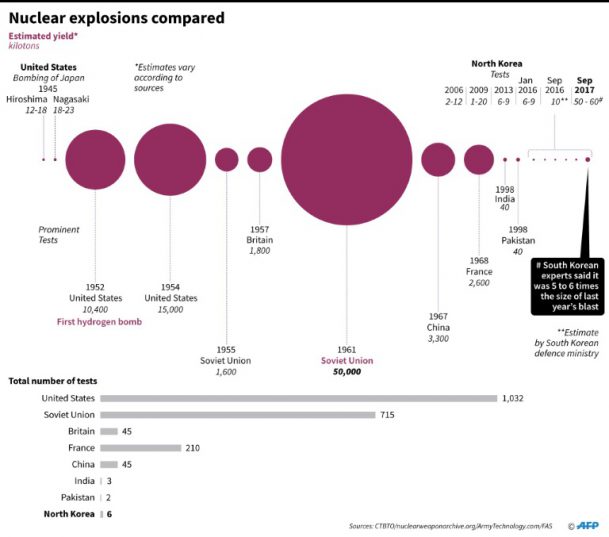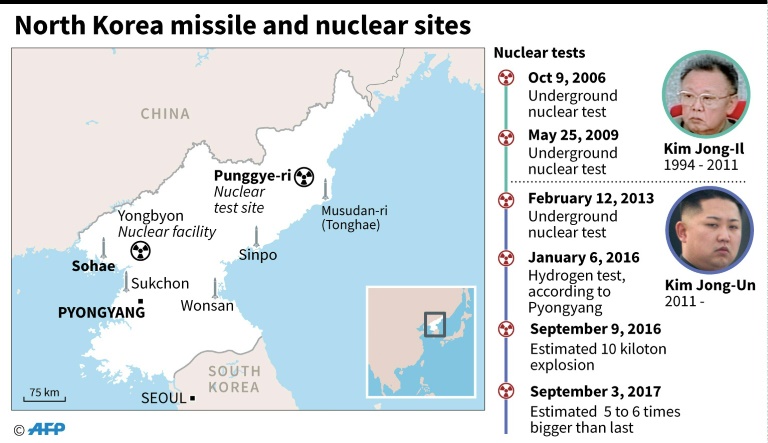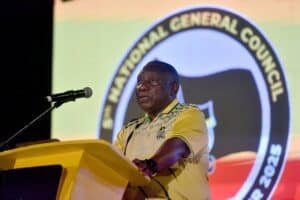North Korea conducted a sixth nuclear test on Sunday, and declared itself in command of a working hydrogen bomb just hours after the explosion.
Here are some key questions around the blast and the isolated state’s nuclear programme.
What kind of bomb was detonated?
North Korea said it had detonated a hydrogen bomb “of unprecedently big power” that can be loaded onto a long-range missile, a step forward that would dramatically escalate the threat it poses.
State media declared the test a complete success and said no radiation had leaked into the atmosphere.
Atomic or “A-bombs” work on the principle of nuclear fission, where energy is released by splitting atoms of enriched uranium or plutonium encased in the warhead.

Hydrogen or H-bombs, also known as thermonuclear weapons, work on fusion and are far more powerful, with a nuclear blast taking place first to create the intense temperatures required.
There was no immediate independent confirmation of the North’s claim. But the blast was its most powerful to date by far and many experts said it had all the hallmarks of a hydrogen bomb.
Japan said it had deployed “sniffer” planes capable of detecting radioactive fallout which can give clues to the type of device detonated, although in the past evidence has been elusive.
How does it compare to previous tests?
The energy released in the earthquake caused by the blast was five to six times more than its previous detonation, in September last year, experts in Seoul said.
That test had a 10-kiloton yield — less than the 15-kiloton US device which destroyed Hiroshima in 1945.
The North has previously claimed to have successfully tested an H-bomb, after its fourth blast in January last year, but experts doubted the claim at the time, due to the relatively weak yield.
The official KCNA news agency said earlier Sunday that the North’s H-bomb had an “explosive power that can be adjusted from tens to hundreds of kilotons depending on the target”.
Could this be North Korea’s last nuclear test?
The North claimed Sunday’s test marked a “very significant occasion” in achieving the “final goal” of becoming a complete nuclear power.
“I think the North has reached a stage where it no longer needs testing. More tests now will be meaningless,” Koo Kab-Woo of the University of North Korean Studies told AFP.

He pointed to the fact that Pakistan — whose nuclear programme is believed to have links with the North’s — conducted six nuclear tests in total, and may not have seen a need for any further blasts.
“If we look at it from Pakistan’s example, the North might be in the final stages” of becoming a nuclear state, he said.
The North has given the ultimate demonstration of its power by testing an H-bomb, Cha Du-Hyeogn of Asan Institute of Policy Studies said, and wanted the US to believe its claims.
“Any technological tests can be seen as playing poker,” Cha said. “You want your opponent to read your move as you intended.”
What will the North do next?
Analysts are divided on whether Sunday’s test could lead to more North Korean provocations, or become an opening for dialogue.
While North Korea has tested an intercontinental ballistic missile (ICBM) that apparently brings much of the US mainland into range, questions remain about reliability and whether it has mastered the re-entry technology to bring a warhead back through the Earth’s atmosphere.
It also has yet to show proof of its claims of miniaturisation.
Pyongyang could launch another ICBM in the next few months, Cha said.
It could also begin actual deployment of its new arsenal, said Yoo Ho-Yeol of the Korea University, while seeking an opening for diplomacy with the Trump administration.
The deployment will be carried out “at the most propitious moment to maximise their diplomatic impact,” Yoo told AFP.
In any case, Pyongyang will seek recognition from the international community as a nuclear state, said Go Myong-Hyun at the Asan Institute of Policy Studies.
How will South Korea and the US react?
South Korean President Moon Jae-In called for the “strongest punishment” against Pyongyang, and “all diplomatic measures including UNSC sanctions resolutions to completely isolate North Korea”.
Professor Koo of the University of North Korean Studies said the test was a major setback for Moon’s hopes of improving inter-Korean ties. The new leader favours engagement as well as sanctions to bring Pyongyang to the negotiating table.
The US has not yet given an official comment about Sunday’s test, although a fiery tweet from Trump could further escalate geopolitical tensions.
After North Korea last week fired a missile over Japan, another US ally, Trump tweeted: “The US has been talking to North Korea, and paying them extortion money, for 25 years. Talking is not the answer!”
Trump’s rhetoric has appeared to allude to possible military action, but his former chief adviser Steve Bannon told The American Prospect: “There’s no military solution, forget it.”






